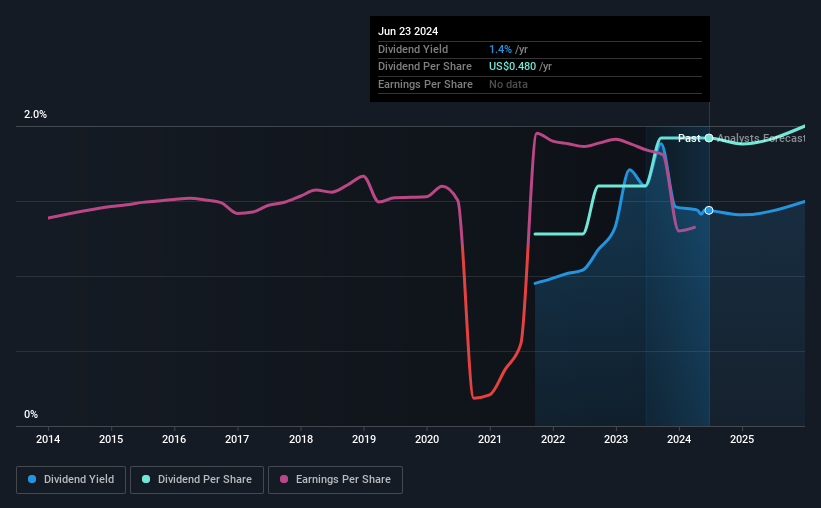We Wouldn't Be Too Quick To Buy Equity Bancshares, Inc. (NYSE:EQBK) Before It Goes Ex-Dividend
Equity Bancshares, Inc. (NYSE:EQBK) is about to trade ex-dividend in the next four days. Typically, the ex-dividend date is one business day before the record date which is the date on which a company determines the shareholders eligible to receive a dividend. The ex-dividend date is important as the process of settlement involves two full business days. So if you miss that date, you would not show up on the company's books on the record date. In other words, investors can purchase Equity Bancshares' shares before the 28th of June in order to be eligible for the dividend, which will be paid on the 15th of July.
The company's upcoming dividend is US$0.12 a share, following on from the last 12 months, when the company distributed a total of US$0.48 per share to shareholders. Based on the last year's worth of payments, Equity Bancshares stock has a trailing yield of around 1.4% on the current share price of US$33.39. Dividends are an important source of income to many shareholders, but the health of the business is crucial to maintaining those dividends. So we need to check whether the dividend payments are covered, and if earnings are growing.
See our latest analysis for Equity Bancshares
Dividends are typically paid from company earnings. If a company pays more in dividends than it earned in profit, then the dividend could be unsustainable. Equity Bancshares is paying out an acceptable 74% of its profit, a common payout level among most companies.
Generally speaking, the lower a company's payout ratios, the more resilient its dividend usually is.
Click here to see the company's payout ratio, plus analyst estimates of its future dividends.
Have Earnings And Dividends Been Growing?
Companies with falling earnings are riskier for dividend shareholders. If earnings fall far enough, the company could be forced to cut its dividend. With that in mind, we're discomforted by Equity Bancshares's 23% per annum decline in earnings in the past five years. Such a sharp decline casts doubt on the future sustainability of the dividend.
Another key way to measure a company's dividend prospects is by measuring its historical rate of dividend growth. Equity Bancshares has delivered 14% dividend growth per year on average over the past three years. That's interesting, but the combination of a growing dividend despite declining earnings can typically only be achieved by paying out more of the company's profits. This can be valuable for shareholders, but it can't go on forever.
The Bottom Line
Should investors buy Equity Bancshares for the upcoming dividend? Earnings per share have been declining and the company is paying out more than half its profits to shareholders; not an enticing combination. Equity Bancshares doesn't appear to have a lot going for it, and we're not inclined to take a risk on owning it for the dividend.
So if you're still interested in Equity Bancshares despite it's poor dividend qualities, you should be well informed on some of the risks facing this stock. Our analysis shows 1 warning sign for Equity Bancshares and you should be aware of this before buying any shares.
If you're in the market for strong dividend payers, we recommend checking our selection of top dividend stocks.
Have feedback on this article? Concerned about the content? Get in touch with us directly. Alternatively, email editorial-team (at) simplywallst.com.
This article by Simply Wall St is general in nature. We provide commentary based on historical data and analyst forecasts only using an unbiased methodology and our articles are not intended to be financial advice. It does not constitute a recommendation to buy or sell any stock, and does not take account of your objectives, or your financial situation. We aim to bring you long-term focused analysis driven by fundamental data. Note that our analysis may not factor in the latest price-sensitive company announcements or qualitative material. Simply Wall St has no position in any stocks mentioned.
Have feedback on this article? Concerned about the content? Get in touch with us directly. Alternatively, email editorial-team@simplywallst.com

 Yahoo Finance
Yahoo Finance 
